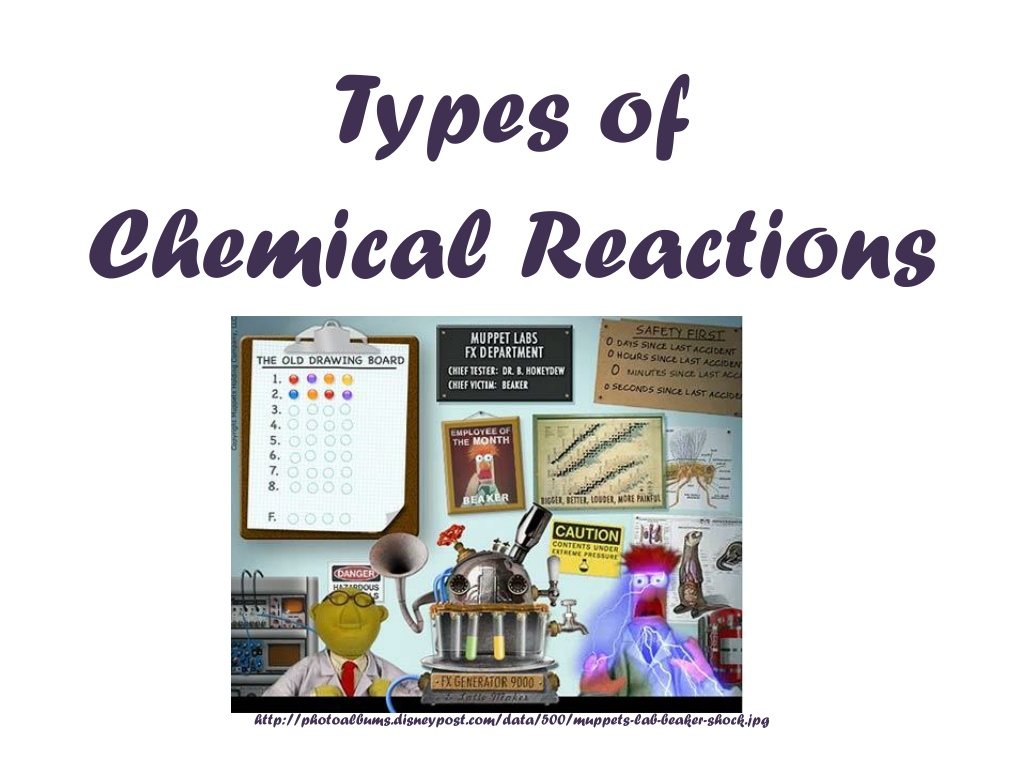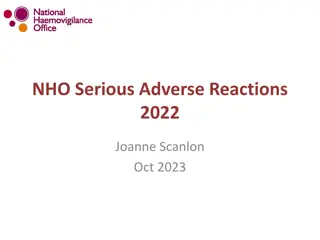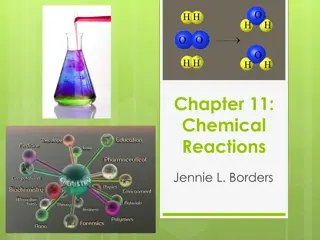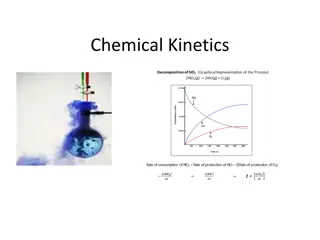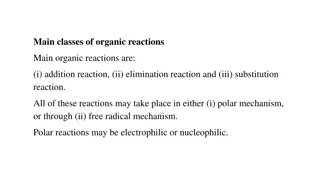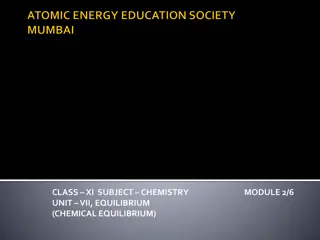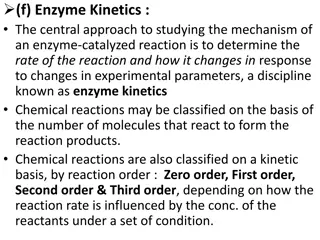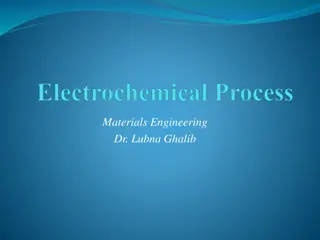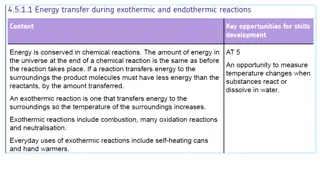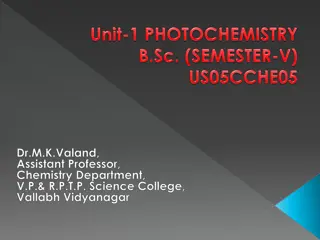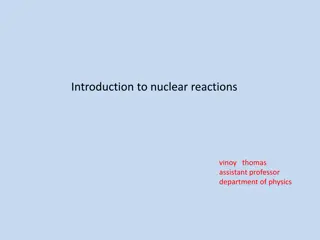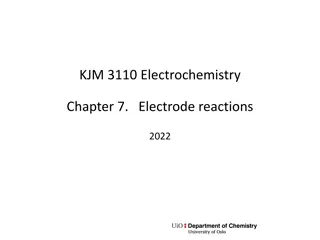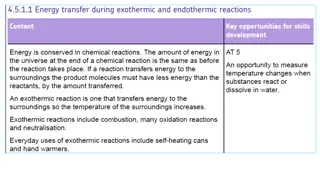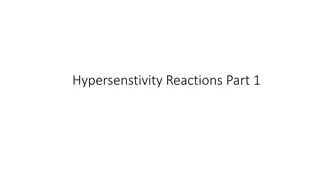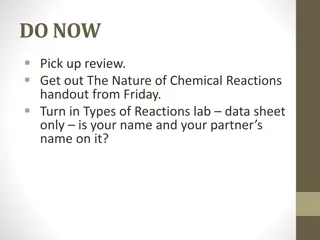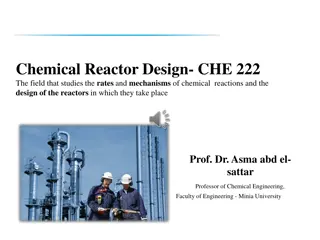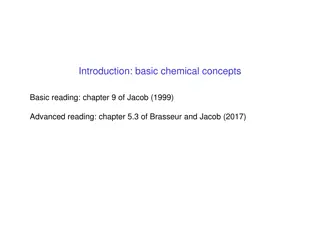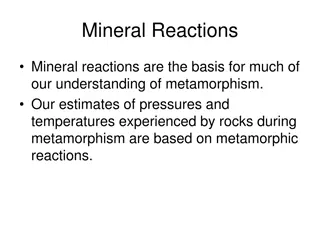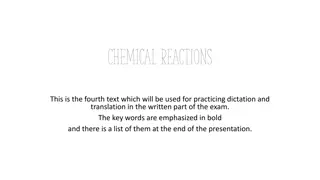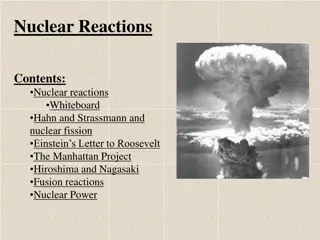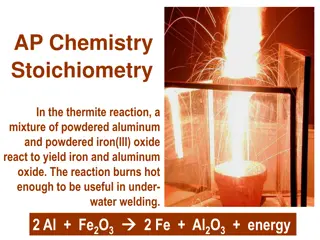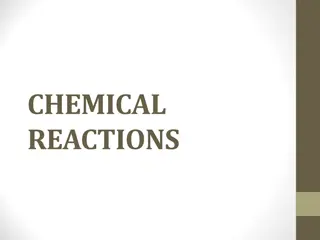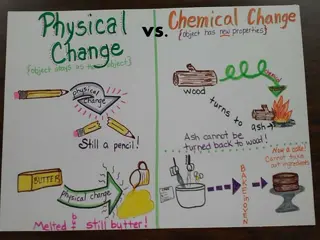Understanding Different Types of Chemical Reactions
Chemical reactions involve the transformation of reactants into products. This comprehensive guide covers various types of reactions, including synthesis, decomposition, single-replacement, double-replacement, and combustion. Each reaction type is explained with examples and observable evidence such as flammability, color change, formation of precipitates, and gas production.
Download Presentation

Please find below an Image/Link to download the presentation.
The content on the website is provided AS IS for your information and personal use only. It may not be sold, licensed, or shared on other websites without obtaining consent from the author. Download presentation by click this link. If you encounter any issues during the download, it is possible that the publisher has removed the file from their server.
E N D
Presentation Transcript
Types of Chemical Reactions http://photoalbums.disneypost.com/data/500/muppets-lab-beaker-shock.jpg
Chemical Reactions A chemical reaction is a process in which one or more reactants change to make one or more products. http://www.youtube.com/watch?v=uqDWbknpiVk&feature=related http://www.youtube.com/watch?v=896vJj6eWYw&NR=1 https://www.youtube.com/watch?v=FofPjj7v414 ** http://images3.wikia.nocookie.net/muppet/images/f/f1/Bunsenbeakerpaperclips.jpg
Evidence of Chemical Reactions 1. Flammability http://www.youtube.com/watch?v=uj9D3mc7tVg&feature=related http://www.youtube.com/watch?v=MUensqImzXM http://www.youtube.com/watch?v=7Xu2YZzufTM ** https://www.youtube.com/watch?v=zdeSRRjaiTE ** 2. Change of Color https://www.youtube.com/watch?v=kKlXe2mrnHQ ** https://www.youtube.com/watch?v=C5tOEBmBAHg ** http://www.youtube.com/watch?v=hVK9Om4wzBM&feature=related 3. Precipitate https://www.youtube.com/watch?v=BGUfC3UUBkI ** https://www.youtube.com/watch?v=GgNA-CAjfVQ ** http://www.youtube.com/watch?v=egfXTENCRA0 http://www.youtube.com/watch?v=8RmVwz2fNGc&feature=related 4. Gas Production http://www.youtube.com/watch?v=ezsur0L0L1c&feature=related http://www.youtube.com/watch?v=9vk4_2xboOE http://www.youtube.com/watch?v=uQ05eALMBEo&feature=related
Synthesis Reactions A chemical reaction in which two or more substances react to form a single substance. A + B AB H2 + O2 H2O2 http://upload.wikimedia.org/wikipedia/en/thumb/2/2c/Beaker_muppet.jpg/220px-thumb.jpg
Decomposition Reactions A chemical reaction in which one compound breaks down to form two or more simpler substances. AB A + B CO2 C + O2 http://images4.wikia.nocookie.net/__cb20100211160001/muppet/images/thumb/c/cd/212 20.jpg/250px-212-20.jpg
Single-Replacement Reactions A chemical reaction in which one element takes the place of another element in a compound. A + BC AB + C Zn + H2SO4 ZnSO4 + H2 http://www.town.hull.ma.us/public_documents/hullma_memclass/hughes/0143F3CC 000F8513.0/Beaker%20and%20Dr.%20Bunsen%20Honeydew.jpg
Double-Replacement Reactions A chemical reaction in which two compounds exchange positive ions and form two new compounds. AB + CD AD + CB CaCO3 + 2HCl CaCl2 + H2CO3 http://media.photobucket.com/image/beaker%20and%20Dr.%20Bunsen%20Honeydew/mattygrovesorm e/DrBunsenAndBeaker.jpg
Combustion Reactions A chemical reaction in a substance reacts rapidly with oxygen often producing heat and light. Usually include the elements C, H, and O and produce water. CH4 + 2O2 CO2 + 2H2O http://static.guim.co.uk/sys-images/Arts/Arts_/Pictures/2008/07/18/BeakerHoneydew140x844.jpg
Energy & Reactions The energy stored in the chemical bonds of a substance: chemical energy Reactions involve breaking chemical bonds in the reactants and forming chemical bonds in the products.
Energy & Reactions By comparing the chemical energy of the reactants with the chemical energy of the products you can determine if energy (heat or light) is released or absorbed. Exothermic Energy Released https://www.youtube.com/watch?v=SKSU72-1ERc Endothermic Energy Absorbed https://www.youtube.com/watch?v=MyAzjSdc3Fc
Reaction Rates Some reactions happen to slow. A catalyst: Speeds up the chemical reaction rate Enables the reaction to occur at a lower temperature (without being permanently changed)
